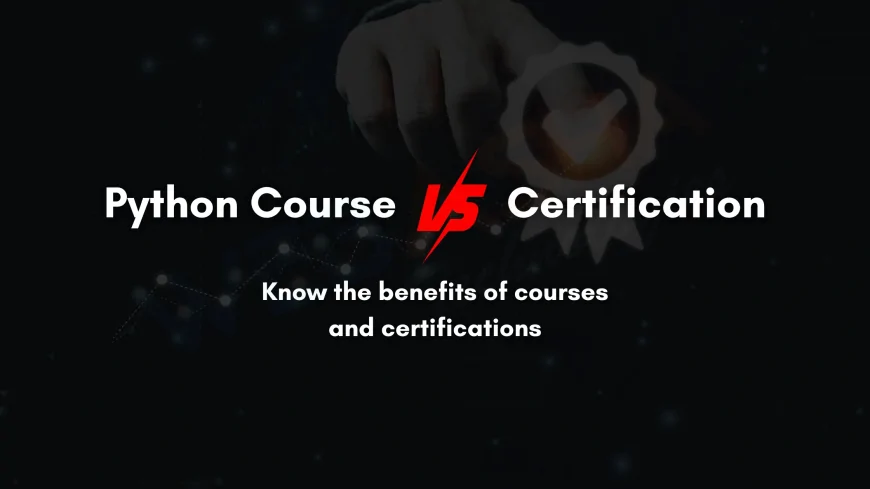Difference Between Python Certification and Python Course: What You Really Need to Know
Confused between a Python certification and a Python course? Discover the key differences, benefits, and career outcomes of both options. Learn how the Python Institute in Pune helps you choose the right path with expert training, practical projects, and certification support.

When starting out in the world of Python programming, many people often wonder whether they should opt for a Python course or pursue a Python certification. Both of these options are important milestones for anyone looking to enhance their skills in Python, but they serve very different purposes. Understanding the difference between Python certification and a Python course is crucial to making an informed decision about your learning path.
In this blog post, we will dive deep into the distinctions between these two, breaking down their features, benefits, and which one is right for you depending on your career goals, experience, and learning style.
The Journey of Learning Python
Python has cemented its position as one of the most popular and versatile programming languages in the world. Whether you are building web applications, developing machine learning models, or automating tasks, Python plays a central role in modern software development.
Learning Python opens up numerous career opportunities in various fields, including data science, web development, artificial intelligence, and more. However, the learning path can be daunting for beginners, especially when confronted with terms like "Python certification" and "Python course."
This blog will guide you through the differences between Python courses and certifications, helping you choose the right option for your learning goals and professional aspirations. By the end of this post, you will have a clear understanding of both, enabling you to make the best decision for your future in Python programming.
What Is a Python Course?
A Python course is a structured educational program designed to teach you Python programming, from the basics to advanced concepts. Whether it is an online platform or an in-person class, Python courses are intended to help you build practical programming skills and gain hands-on experience in writing Python code.
Python courses are often divided into several modules or lessons. Depending on the course's depth, you can expect to cover topics such as:
-
Introduction to Python syntax and programming concepts
-
Understanding variables, data types, and operators
-
Control flow statements such as loops and conditionals
-
Functions and modules in Python
-
Object-Oriented Programming (OOP)
-
Working with libraries like NumPy, Pandas, and Matplotlib
-
Web development with Python (Flask, Django)
-
Machine learning and data analysis using Python
-
Advanced Python topics such as decorators, generators, and context managers
A typical Python course is designed to gradually build knowledge and allows learners to progress at their own pace. Python courses offer a hands-on approach that allows you to solve problems, complete assignments, and even work on real-world projects. This makes Python courses ideal for anyone who is completely new to programming or for those who want to deepen their knowledge.
Key Features of a Python Course:
-
Comprehensive Learning: Courses typically cover a wide range of topics to ensure you develop a strong understanding of the language.
-
Practical Skills: Courses often involve exercises and coding projects that give you real-world experience.
-
Learning Pace: Python courses can be taken at your own pace, offering flexibility for learners.
-
Resources: Many courses provide access to lectures, tutorials, forums, and assignments, which offer ample opportunities to practice and solidify your skills.
Python courses are suitable for people at all levels – from beginners with no prior programming knowledge to intermediate or advanced programmers who want to level up their skills.
What Is Python Certification?
Python certification is an official recognition that demonstrates your proficiency and knowledge in Python programming. Obtaining a Python certification means that you have passed an assessment or exam and have been deemed capable of working with Python at a certain level.
Python certifications are often offered by universities, accredited organizations, or platforms with official accreditation. The certification process typically requires you to demonstrate your ability to work with Python through a series of exams or practical tests.
The key purpose of a Python certification is professional validation. By holding a certification, you are showcasing your skills to potential employers, colleagues, and clients. It can significantly boost your credibility and employability, especially if you're looking to transition into Python-based careers such as data science, machine learning, or web development.
A Python certification can help prove to employers that you possess the practical knowledge and theoretical understanding of Python programming, making it easier to secure higher-paying job opportunities or promotions.
Key Features of Python Certification:
-
Industry Recognition: Certifications are widely recognized by employers and serve as evidence of your Python skills.
-
Exam-Based Evaluation: To receive certification, you must pass an exam or demonstrate proficiency in certain topics.
-
Proof of Competency: Certification validates your knowledge and proves that you are ready for real-world Python programming jobs.
-
Career Enhancement: Python certifications can improve your career prospects and open doors to higher-level positions and higher salaries.
Python certification is ideal for individuals who already have some experience with programming and want to formalize their skills with official documentation.
The Key Differences Between Python Certification and Python Course
1. Purpose and Focus
-
Python Course: A Python course is focused on teaching you Python programming. It is an educational journey that helps you gain knowledge and hands-on skills to become proficient in Python.
-
Python Certification: A Python certification is focused on validating the skills you already possess. It is an official recognition of your ability to apply Python in real-world scenarios.
2. Learning vs. Testing
-
Python Course: A course emphasizes learning. It is designed to guide you step-by-step through concepts, helping you learn new skills, tackle coding problems, and apply Python in practical projects.
-
Python Certification: A certification is about testing your knowledge. It typically requires you to take an exam or complete an assessment that validates your expertise in Python.
3. Depth of Learning
-
Python Course: A course usually starts with basic concepts and builds up to more advanced topics. The objective is to give you a comprehensive understanding of Python and provide the skills needed for various applications.
-
Python Certification: Certification exams focus on specific skills or areas within Python (such as web development or data analysis). You will need to demonstrate your proficiency in a range of topics to earn the certification.
4. Duration
-
Python Course: Python courses usually last for several weeks or months, depending on whether it is part-time or full-time. The course may include lectures, exercises, projects, and assessments.
-
Python Certification: Certification preparation is generally much shorter and more focused. It usually involves studying for and taking an exam. The duration is often a few weeks, depending on your level of preparation.
5. Outcome and Credentialing
-
Python Course: A Python course typically offers a completion certificate that acknowledges that you have successfully completed the course. However, this is not always recognized as an official certification in the industry.
-
Python Certification: Certification results in an official credential that is widely recognized by employers and can enhance your career prospects.
6. Suitability for Beginners
-
Python Course: Courses are ideal for beginners who are new to programming. They offer a structured approach to learning Python from the ground up.
-
Python Certification: Certification is better suited for individuals who already have some foundational knowledge of Python and want to validate or formalize their skills.
Which Path Should You Choose?
Choosing between a Python course and Python certification depends on your goals, experience level, and career aspirations. Here are some factors to consider when making your decision:
-
If you are a beginner, starting with a Python course is the best choice. It will give you a solid foundation in Python programming and prepare you for advanced learning.
-
If you already have some experience with Python and want to gain formal recognition for your skills, pursuing a Python certification is the right step. It will serve as proof of your abilities and enhance your credibility in the job market.
FAQs
What is the difference between a Python course and a Python certification?
A Python course is designed to teach Python programming from scratch or at an advanced level. A Python certification, on the other hand, is an official credential you earn after passing a recognized exam that validates your skills. Python Training Institute in Pune offers both options, depending on your learning goals.
Can I get a Python certification without taking a course?
Yes, if you already have Python experience, you can appear directly for certification exams. However, taking a structured Python course at Python Training Institute in Pune helps you prepare better with real-world projects, practice tests, and expert mentorship, increasing your chances of certification success.
Which is better for job opportunities: Python course or certification?
Both are valuable, but a Python certification holds more weight on a resume as it validates your skills. However, a course builds the foundation. Python Training Institute in Pune recommends completing a course first, then getting certified to maximize career benefits.
Do I need prior experience for Python certification?
Most certification programs assume some prior knowledge of Python. That’s why Python Training Institute in Pune offers beginner-to-pro certification pathways, ensuring you build the skills needed before appearing for the certification exam.
How long does it take to complete a Python course?
A typical Python course at Python Training Institute in Pune takes 8–12 weeks, depending on the level and mode (online/offline). It includes hands-on projects, live sessions, and doubt-clearing classes to provide a well-rounded learning experience.
What kind of certification do I get after completing a Python course?
You receive a course completion certificate from the Python Training Institute in Pune. While not equivalent to an industry certification, it still demonstrates your learning efforts and practical understanding of Python programming.
Is a course certificate the same as a professional certification?
No. A course certificate verifies you’ve completed training, while a professional certification is awarded after passing an exam that evaluates your skills. Both can enhance your resume but serve different purposes.
Can beginners join a Python certification program?
It’s recommended that beginners first enroll in a course. At Python Training Institute in Pune, you can start with a beginner course and then transition into a certification preparation program to build confidence and technical strength.
Does Python certification guarantee a job?
While no certification guarantees a job, having a recognized Python certification improves your visibility to employers. Python Training Institute in Pune also offers placement assistance, resume-building, and interview training to boost employability.
Are Python courses online or offline?
Python Training Institute in Pune offers both online and offline Python courses, making it flexible for learners from different locations and backgrounds. You can choose your preferred learning mode without compromising on quality.
What skills can I learn in a Python course?
A Python course covers skills like variables, functions, data structures, OOP, libraries (NumPy, Pandas), web frameworks, and data analysis. The course at Python Training Institute in Pune is designed to be industry-ready with projects and assessments.
What is included in Python certification training?
Certification training at Python Training Institute in Pune includes exam-specific preparation, practice quizzes, mock tests, and one-on-one mentoring. It helps you align with the certification standards and pass confidently.
Do companies recognize course certificates?
Yes, but professional certifications tend to carry more weight during hiring. That’s why Python Training Institute in Pune offers a combination of courses + certification prep to give students the best of both worlds.
Which one is more affordable, Python course or certification?
Generally, a Python course is more affordable, especially when offered in bundles. Python certification exams can be costlier due to their global recognition. However, Python Training Institute in Pune offers combo packages that balance both.
How do I decide between a Python course and certification?
If you’re a beginner or intermediate learner, start with a course. If you’re confident in your skills, go for certification. Python Training Institute in Pune’s counselors help you choose the right path based on your career goals.
Are there prerequisites for Python certification?
Yes, many certifications require a basic understanding of Python syntax and concepts. Python Training Institute in Pune helps you meet these prerequisites through beginner-friendly training modules.
Will a course help me clear Python certification?
Definitely. Python Training Institute in Pune structures its courses to align with industry certification standards, making certification prep seamless after course completion.
Can I mention a course certificate on my resume?
Absolutely. Course certificates from reputed institutes like Python Training Institute in Pune are well-recognized and showcase your commitment to learning and upskilling.
How is certification beneficial for career switchers?
Python certification validates your new skill set and builds employer trust, especially if you’re moving from a non-technical background. Python Training Institute in Pune also provides career counseling and support to ease this transition.
Is there any hands-on experience in certification programs?
Some certifications are theory-based. That’s why Python Training Institute in Pune includes hands-on projects, case studies, and real-world assignments even in certification training to bridge the gap.
Can I enroll in both a course and certification?
Yes! In fact, it’s the best approach. Python Training Institute in Pune offers combined programs that let you learn, practice, and get certified all in one place.
What topics are covered in Python certification?
Most certification exams test your understanding of data types, loops, functions, OOP, modules, file handling, error management, and standard libraries. Python Training Institute in Pune trains you across all of these.
How are Python courses evaluated?
Evaluations are through quizzes, assignments, final projects, and coding challenges. This helps learners at Python Training Institute in Pune track progress and improve practical skills.
Do Python certifications expire?
Some certifications have lifetime validity, while others require recertification every few years. Python Training Institute in Pune provides updated information and training support for all certification formats.
Is a certification worth it if I already completed a course?
Yes. Certification adds industry validation to your existing knowledge. Python Training Institute in Pune encourages course graduates to take certification exams for better job opportunities and recognition.
Start Your Python Learning Journey Today
While both a Python course and Python certification can be incredibly valuable, they serve different purposes. A Python course is designed to help you learn Python and develop practical coding skills, while a Python certification is a formal validation of your skills, providing industry recognition. Ultimately, choosing between the two depends on where you are in your Python journey and what you hope to achieve with your programming skills.
For those who are just starting, a Python course is the ideal first step. Once you've gained proficiency, pursuing a Python certification will help you formalize your skills and open doors to career advancement.
What's Your Reaction?
 Like
0
Like
0
 Dislike
0
Dislike
0
 Love
0
Love
0
 Funny
0
Funny
0
 Angry
0
Angry
0
 Sad
0
Sad
0
 Wow
0
Wow
0














